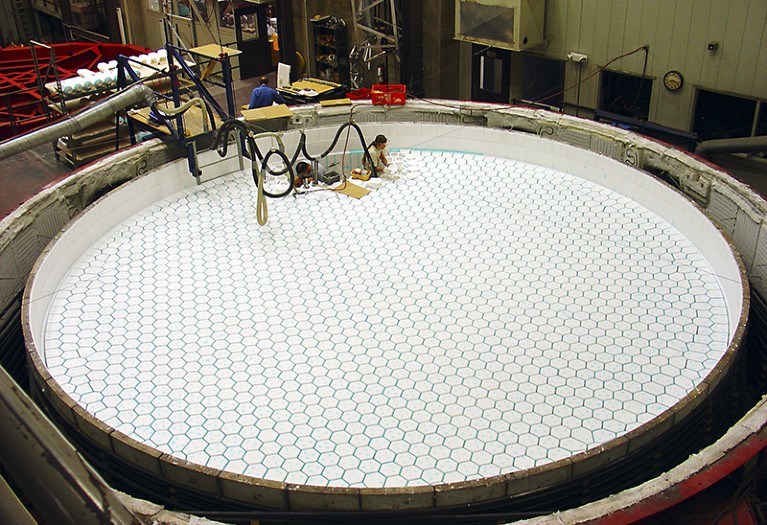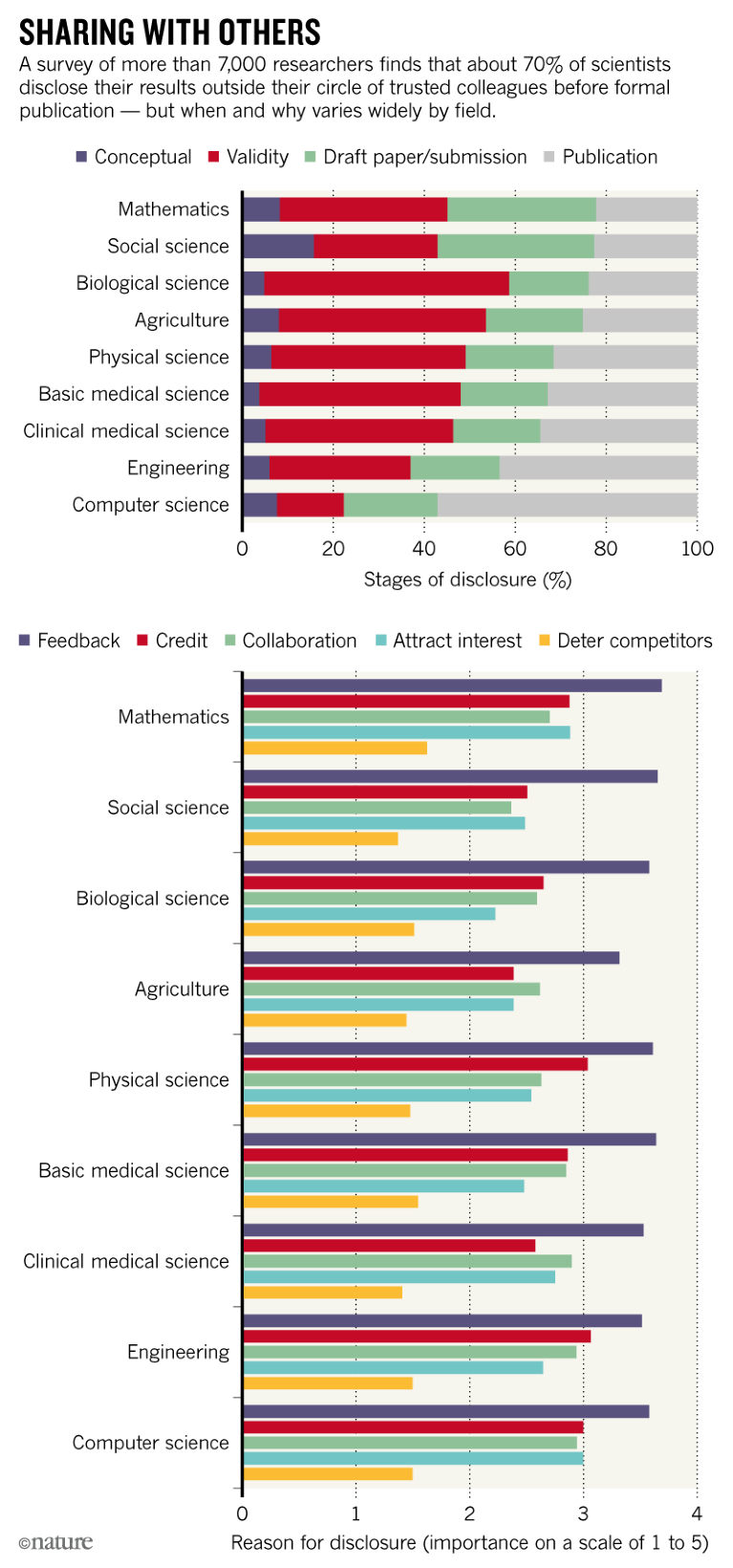POLICY
UK eyes EU science scheme The UK prime minister has declared that she wants her country to be part of the European Union’s next major research-funding programme, which will launch after Britain leaves the EU in March 2019. In a speech on 21 May, Theresa May (pictured) said the government would like the option to “fully associate” itself with Horizon Europe, which will run from 2021 to 2027 and will be the European Commission’s largest-ever science-funding scheme, with a planned budget of almost €100 billion (US$118 billion). May said that in return for paying to take part, she wanted to influence the shape of the scheme. Thirteen non-EU countries are associate members of the current programme, Horizon 2020, and pay a proportion of their gross domestic product so that their scientists can bid for European grants. But none of these nations has input on the programme’s priorities.

UK Prime Minister Theresa May spoke at the Jodrell Bank Observatory in Macclesfield on 21 May. Credit: Peter Powell/EPA-EFE/REX/Shutterstock
Data dissent A panel of science advisers to the US Environmental Protection Agency (EPA) has sharply criticized a proposed rule that would limit the agency’s use of research based on underlying data that are not publicly available. In a 12 May memorandum, a working group of the EPA Science Advisory Board said that the proposed rule could have broad ramifications and should be submitted to the full advisory board for review. The working group said that the Trump administration failed to explain the benefits of the proposal, did not properly assess its potential regulatory impacts, and failed to answer practical questions about its implementation.
Asset uncertainties The Australian Academy of Science is concerned about the lack of detail in the government’s plan to spend Aus$393 million (US$297 million) on research facilities over the next 5 years. On 15 May, the government announced its research infrastructure investment plan. Money will be spent on infrastructure such as next-generation microscopes and imaging equipment, advanced nanoscale fabrication facilities and Australia’s nuclear-research capacities. But the academy is concerned that there is limited detail on when money will be available, and that crucial infrastructure upgrades could be several years away.
RESEARCH
Heart regeneration Japanese physicians are poised to conduct the world’s first clinical study using induced pluripotent stem (iPS) cells to treat heart disease. On 16 May, a health ministry panel approved a plan by Osaka University doctors to use the cells to treat ischemic cardiomyopathy, in which reduced blood flow to the heart compromises the organ’s ability to pump blood. Heart-muscle cells created from iPS cells will be grown in 0.1-millimetre-thick sheets that are expected to release growth factors that will regenerate the heart muscle. iPS cells have been used in several trials to treat retinal disease in humans, but at least one of those has been halted after a patient had an adverse reaction to the transplant. The heart trial is expected to start in three people by March 2019.
EVENTS
Volcano explosion The summit crater of Hawaii’s Kilauea volcano exploded on 17 May, sending a plume of ash about 9 kilometres into the air. The explosion happened after two weeks of increased activity, during which lava had spewed through volcanic fissures and triggered earthquakes that reached magnitude 6.9. The volcanic activity has damaged at least 36 structures and prompted more than 1,800 evacuations. Volcanic air pollution has been reported in the southern part of Hawaii’s Big Island. The US Geological Survey warned the eruption could become more violent and eject “ballistic” rocks up to 2 metres in diameter.
Study on hold The US National Institutes of Health (NIH) has halted a US$100-million study into the health effects of drinking, after news reports suggested that the alcohol industry might have funded it improperly. On 17 May, NIH director Francis Collins said that he was putting the study on hold while his agency investigated allegations that its officials had courted funding from the alcohol industry in violation of NIH rules. The Moderate Alcohol and Cardiovascular Health trial was being run at Harvard University’s Beth Israel Deaconess Medical Center in Boston, Massachusetts, and intended to recruit around 7,800 adults for a 10-year study into whether a single drink per day could confer health benefits.
UK visas refused More than 3,500 scientists and medical and engineering professionals were refused visas to work in the United Kingdom between December 2017 and March 2018. Applicants were refused despite being eligible because the government had, for the fifth month in a row, breached its cap on a class of visa for skilled workers known as Tier 2. Because candidates for PhD-level roles were prioritized for visas, academic scientists were largely unaffected. The government released the figures on 16 May in response to a freedom-of-information request.
SPACE
Observatory pact Two rival telescope organizations have joined forces to give US astronomers broader access to the next generation of big ground-based observatories. The partnership involves the Giant Magellan Telescope Organization (pictured, one of its mirrors), which is building a 24.5-metre telescope in Chile, and the Thirty Meter Telescope International Observatory, which aims to construct in either Hawaii or the Canary Islands. They, along with the National Optical Astronomy Observatory, will encourage US astronomers to propose collaborative research programmes for the extremely large telescopes, which the US National Science Foundation could consider funding.

A mould that will be used to create mirrors for the Giant Magellan Telescope.Credit: Univ. Arizona/SPL
PEOPLE
Energy appointment US President Donald Trump nominated Christopher Fall to lead the Department of Energy’s Office of Science on 18 May. Fall is currently the principal deputy director of the department’s Advance Research Projects Agency–Energy. Before that, he was the acting chief scientist at the Office of Naval Research and assistant director for defence programmes at the White House Office of Science and Technology Policy. Fall has a PhD in neuroscience and a master’s in business administration. At the Office of Science, he will oversee a research budget of around US$5.4 billion.
Russian minister The Russian government has divided its science and education ministry in a shake-up after national elections in March, which handed Vladimir Putin his fourth term as president. Prime Minister Dmitry Medvedev appointed the government’s new cabinet on 18 May, putting Mikhail Kotyukov in charge of the newly created Ministry of Science and Higher Education. Olga Vasilyeva, a church historian who became head of the now-defunct Ministry of Science and Education in 2016, will head the new Ministry of Education. Kotyukov was previously chief of the Federal Agency for Scientific Organizations, which was established in 2013 and reported directly to Putin. The agency, which will now be dismantled, was controversial because it was given effective control of the Russian Academy of Sciences.
HEALTH
Ebola vaccine Health officials in the Democratic Republic of the Congo (DRC) began to distribute an experimental vaccine against Ebola on 21 May, as an outbreak of the infection continues to worsen. Forty-six people had been infected with the virus and 26 had died as of 21 May, according to the World Health Organization. An expert committee assembled by the agency says that the health risk from Ebola in the DRC is now “very high”.
Migraine medicine The US Food and Drug Administration has approved the first in an emerging class of drugs intended to prevent migraines. On 17 May, the agency announced the approval of Aimovig (erenumab-aooe), an antibody therapy that blocks a protein called calcitonin gene-related peptide receptor. This molecule is involved in pain perception, and other migraine treatments that target it are following close behind. Amgen of Thousand Oaks, California, developed the drug with Novartis of Basel, Switzerland.
TREND WATCH
Two-thirds of scientists share results outside their trusted circle before formally publishing them, a survey of more than 7,000 researchers finds. Social scientists and mathematicians are most likely to disclose findings before publication, and computer scientists least likely. About 40% of scientists disclose a result after they are sure of its validity, and 21% share findings once they’ve written or submitted a manuscript. The respondents worked in nine fields in the United States, Germany and Switzerland.

Source: J. G. Thursby, C. Haeussler, M. C. Thursby & L. Jiang Sci. Adv. 4, eaar2133 (2018).



